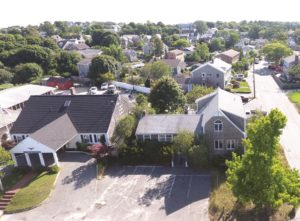PROVINCETOWN — The former Provincetown Medical Group building on Shank Painter Road has been sold and will be redeveloped into a three-story building with eight condominiums.
This story would not be news in a town where so many buildings have been converted into condos, but this is the first such conversion to be permitted using the town’s so-called inclusionary bylaw — designed to allow a developer to increase the density of a project if it includes affordable housing.
Under this new process, the developer got to create more units at the Shank Painter site because he agreed to make one of them affordable. To provide the second required affordable unit, he purchased an apartment in a different location and agreed to sell it through the town’s affordable housing lottery process. That off-site property is at 26 Nelson Ave.
Edward “Ted” Roach, one of the managers of Meili West LLC, had originally wanted to build 13 condominiums at the Shank Painter location. The existing building housed the medical practice of Dr. Brian O’Malley and the late Dr. Wilsa Ryder for almost 40 years. It is next door to the Provincetown Police Station and had at one time been considered as a possible location for an expanded police headquarters.
Demolition of the old building should begin in one or two months, Roach said. His project went from 13 units with four affordable down to eight units with one affordable in the building and one located off site. To comply with the inclusionary bylaw, the off-site apartment must be sold to an income-eligible buyer.

The off-site option, Roach said, allowed him to maximize the profitability of the units on Shank Painter, which will be new and in a more valuable, in-town location than Nelson Avenue.
“If you don’t make money, nobody is going to do it,” he said. Roach bought the property for $1.2 million.
Roach, who rebuilt Jan Kelly’s apartment building on Bradford Street, proposed to make the 3,268-square-foot medical building into condominiums after a previous developer, Doug Dolezal, gave up trying to navigate the complex new inclusionary bylaw.
Roach said he found the inclusionary bylaw process challenging because so many board members weighed in and many did not understand the process or their jurisdiction. The permitting process took 16 months, though Roach said that’s not so long, considering the pandemic.
Still, the process could be streamlined, he said, and he hopes it will be, so that more developers take advantage of the opportunity.
“It was a year and a half of getting shut down and then accepted,” Roach said. “We were approved for 11 units at one point, and then that got knocked down at the next meeting.”
Roach said he cannot remember how many units the building could have had by right without the inclusionary bylaw.
Attorney Christopher Snow represented him before the zoning board of appeals. According to the minutes of its July 3, 2020, meeting, the ZBA granted special permits to demolish and rebuild a pre-existing, nonconforming structure and a special permit to exceed the scale allowance in the neighborhood.
Snow told the ZBA there will be a 173.9-percent increase over the existing building scale and the actual structure will be 318-percent increase over the neighborhood average building scale allowed by right, the minutes state. The scale conforms to other large structures in the neighborhood, Snow argued, such as the Methodist Church and the Provincetown Fire Station.



